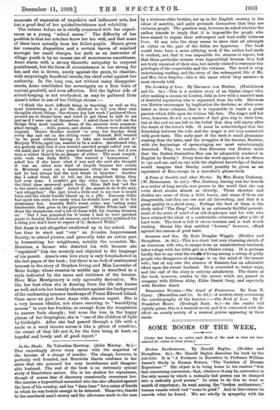In the Shade. By Valentina Hawtrey. (John Murray. Cs.)— This
exceedingly clever story opens with the acquittal of the heroine of a charge of murder. The charge, however, is perfectly well founded, and Henrietta Harris confesses to her sister that she poisoned her very troublesome and disagree- able husband. The rest of the book is an extremely cynical study of Henrietta's nature. She is tee shallow for repentance, though of course fear of discovery occasionally overcomes her. She marries a hypocritical scoundrel who has also offended against the laws of his country, and has "done time" fora series of frauds in which he was foolish enough to be detected. These two, thanks to the murdered man's money and the allowance made to the man
by a virtuous elder brother, set up in the English country in the odour of sanctity, and quite persuade themselves that they are virtuous people. The question may, however, be asked whether the author intends to imply that it is impossible for people who have sinned to regain their self-respect and lead really virtuous lives. At any rate, the story seems to show that all attempts at virtue on the part of the fallen are hypocrisy. The book would have been a more edifying work if the author had made it evident, not that it was impossible for sinners to repent, but that these particular sinners were hypocritical because they had not truly repented of their sins, but merely wished to reassume tho privileges of the respectable and the virtuous. The novel is very entertaining reading, and the story of the subsequent life of Mr. and Mrs. Gore Smythe—this is the name which they assume—is most cleverly told.
























































 Previous page
Previous page